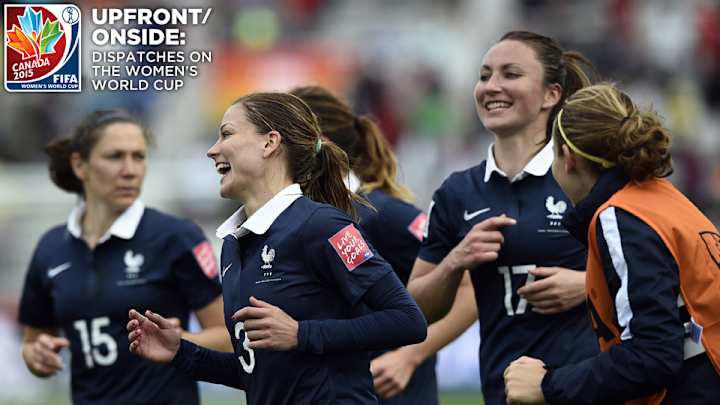Get to know Les Bleues: France's Women's World Cup contenders

France began its World Cup campaign earlier this week with a 1-0 win over England amidst soggy conditions at Moncton Stadium. It wasn’t the prettiest of games. Both teams exhibited less-than-ideal performances on the pitch, but a victory is three points closer to progressing out of the group stage of play for one of the tournament’s favorites to go the distance. As Les Bleues forward Eugénie Le Sommer told the press afterwards, the victory “is good for confidence.”
And confidence is something that typically dogs French teams, at least, on the men’s side. When confidence is high and team spirit transcends the locker room, things go well. When it doesn’t, well…
Thankfully, Les Bleues are a different breed. It is a team chock-a-block with seasoned veterans and several rising talents. Moreover, there is a veritable ésprit de corps on and off the field. There are several compelling narratives driving France at this tournament. What should you know about France this summer? Here are five things:
1. There is an #objectifcanada in French quarters to prove to themselves—and the rest of us—that they have what it takes to make it all the way to the final. French Football Federation (FFF)’s Secretary General and former player, Brigitte Henriques, spoke with me for the New Yorker and elaborated on how “French Women Are Taking Over Soccer.”
Hashflags, handles and more: Twitter and the 2015 Women's World Cup
2. Les Bleues on Twitter. Most of the players on the team has very active accounts that they use in different ways. How do they portray themselves to the public? Whom do they support? How does the public seem to interact with them? As recently as the 1980s and 1990s, French players encountered long-held stereotypes about girls and women who play football. How are they personally managing—and changing—these notions via social media?
A glimpse of this can be viewed in Surface Magazine’s special edition, “Women’s Issue.”
3. The key players: of which there are many. Le Sommer, who was voted best player in France’s female Ligue 1 this season, has already proved her mettle on the pitch with her goal against England, but there are others to watch. In goal, Sarah Bouhaddi is the first line of defense, a position she is taking up after missing the 2011 World Cup.
Defender Laure Boulleau of PSG is one of the players most heavily covered by the media, but others have credentials as ones-to-follow, such as her fellow PSG teammate (and captain) defender Sabrina Delannoy; the EDF (équipe national de France captain Wendi Renard; the rare player who has played in the United States, Camille Abily; and Amadine Henry. Then there are Jessica Houara-D’Hommeaux, another defender from PSG; forward Gaetane Thiney and midfielder Louisa Necib.
4. Media coverage of France, both at home and in the Anglophone press, and how it reflects or shapes public opinion of the team. Thus far, major media outlets, whether in the traditional news press such as Le Monde or the sports press (L’Équipe) are devoting resources and column inches (or online space) to Les Bleues. How will it continue or change as the tournament progresses?
Upfront and Onside: Dispatches on the 2015 Women's World Cup in Canada
5. Fear of what other shoes will drop in the unfolding FIFA investigations, and how that might impact—or not—the women’s tournament. The stakes are even higher as France will host the 2019 tournament. There is much less money involved in the women’s game, for better or worse, so perhaps it will remain untouched. Still, as everyone waits with baited breath, there's an aura of uneasiness surrounding the competition.
I spoke with George Eddy, a French-American journalist for Canal+, earlier this year about French basketball and the impact of Les Bleues in Canada on the nation’s élan. The year was baptized by fire with the January Charlie Hebdo attacks. Tragedy for the hexagone quickly followed in March when several Olympians died in an Argentine helicopter crash.
For Eddy, the “excellent results” achieved in recent years by the women’s football team and the men’s basketball team “gives the French population a chance to be positive about something.” That can be a good thing. A strong run at the World Cup this summer could help improve the national mood and, as Eddy noted, “smile about something French.”
Lindsay Sarah Krasnoff is a historian and the author of “The Making of Les Bleus: Sport in France, 1958-2010.” Her work has appeared in The New Yorker and The New Republic. She can be followed on Twitter @lempika7.
